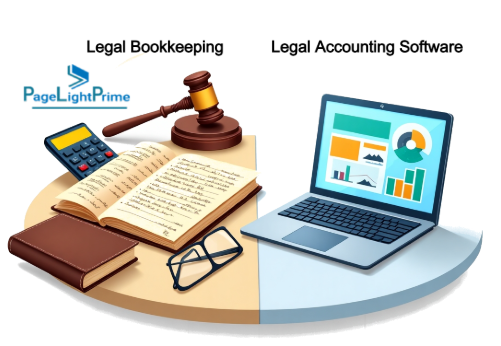What is Legal Bookkeeping
Legal bookkeeping is a specialized form of bookkeeping tailored to meet the unique financial and regulatory needs of law firms and legal professionals. Unlike general bookkeeping, it requires strict adherence to bar association rules and ethical standards—particularly when managing sensitive client trust accounts.
Written by Knowledge Team, posted on May 30, 2025

Why Legal Bookkeeping Matters for Law Firms
Imagine this: your firm receives a large settlement on behalf of a client. That money must be held in a client trust account—separate from the firm’s operating funds—and carefully tracked. A minor error could lead to disciplinary action, client disputes, or even loss of license.
That’s why legal bookkeeping is more than just data entry—it’s about compliance, accountability, and protecting your firm’s reputation.
To manage this complexity, many firms use Legal Trust Accounting Software, which simplifies compliance with bar regulations, ensures accurate tracking of funds, and helps prevent costly mistakes.

Legal Bookkeeping vs. Legal Accounting Software
While legal bookkeeping handles day-to-day transactions, legal accounting software provides broader financial oversight.
Legal accounting software is a specialized financial management tool designed for law firms. It goes beyond daily operations by offering financial reporting, budgeting, and tax preparation—ensuring compliance and financial health.
| Feature | Legal Bookkeeping Software | Legal Accounting Software |
| Primary Purpose | Manages daily transactions | Manages overall financial strategy |
| Key Functions | Billing, invoicing, tracking expenses, payroll | Financial reporting, budgeting, tax preparation |
| Focus Area | Operational tasks within legal workflows | Big-picture financial health |
Using both types of software in tandem ensures that your firm is not only compliant day-to-day but also financially resilient and strategically informed.

Benefits of Using Legal Bookkeeping Software
Legal bookkeeping software is designed specifically for law firms—and using them can transform your operations:
- 🖌️ Streamline billing and payroll
- 🖌️ Ensure compliance with legal and ethical guidelines
- 🖌️ Improve financial transparency and reduce errors
- 🖌️ Free up time for attorneys to focus on client work
- 🖌️ Prepare for audits or client billing disputes with confidence

Legal Bookkeeping Activities Checklist
Here’s what efficient legal bookkeeping looks like in practice:
- 🔴 Track and reconcile client trust accounts using Legal Trust Accounting Software
- 🔴 Record daily transactions: billable hours, expenses, payments, and invoices
- 🔴 Reconcile bank statements regularly for accuracy
- 🔴 Manage payroll for attorneys and staff
- 🔴 Generate financial reports: P&L statements, balance sheets, cash flow
- 🔴 Ensure compliance with bar association rules and industry regulations
- 🔴 Collaborate with accountants on tax prep and strategic planning
- 🔴 Maintain clear records for audits and billing disputes
- 🔴 Monitor receivables and follow up on overdue payments
- 🔴 Budget and forecast for long-term financial health

Real-World Application: A Quick Example
For example, a mid-sized law firm in California managing over 50 active client trust accounts relies on PageLightPrime’s automated trust reconciliation features. With automated overdraft alerts and compliance-ready reports, they save over 20 hours per month in manual work—ensuring both efficiency and audit readiness.

“
Conclusion: Get Bookkeeping Right—Right from the Start
Legal bookkeeping isn’t optional, it’s foundational. With the right tools in place, your firm can maintain compliance, reduce administrative burdens, and keep your financial operations running smoothly.
Ready to Improve Your Firm’s Financial Health?
Explore trusted Legal Bookkeeping Software, talk to a legal accountant, or reach out to software providers that specialize in legal compliance. The sooner you streamline your systems, the more time you can spend focusing on your clients—not your spreadsheets.

“
Frequently Asked Questions: (FAQ)
Do all law firms need legal bookkeeping software?
Yes, most law firms—regardless of size—benefit greatly from legal bookkeeping software. It simplifies compliance, improves accuracy, and saves time by automating billing, tracking, and reporting tasks.
What is a client trust account, and why is it important?
A client trust account holds client funds that must be kept separate from the law firm’s operating funds. Mismanagement of these funds can lead to disciplinary action or disbarment. Legal trust accounting software helps ensure these accounts are handled properly.
Can I use general accounting software like QuickBooks for my law firm?
You can—but it’s not recommended without legal-specific integrations or add-ons. Standard accounting software lacks features like trust account tracking, matter-based billing, and legal compliance reporting, which are critical for law firms.
What features should I look for in legal bookkeeping software?
Look for tools that offer:
- Trust accounting support
- Time and expense tracking
- Invoicing and billing by matter
- Financial reporting
- Integration with legal case management systems
- Compliance with bar association rules
How often should I reconcile trust accounts?
Trust accounts should be reconciled monthly at minimum, and some jurisdictions require more frequent reconciliation. Regular reviews help avoid compliance issues and catch discrepancies early.
Is legal bookkeeping the same as legal accounting?
Not exactly. Legal bookkeeping focuses on daily transaction tracking, while legal accounting involves big-picture financial planning, such as tax preparation, budgeting, and forecasting. Both are essential but serve different purposes.
